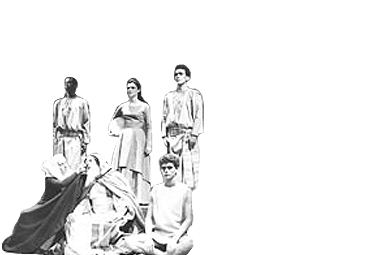Ruídos pulsativos

Avant-Garde na Bahia
The Theater School at the Universidade Federal da Bahia (Federal University of Bahia) was founded in 1956. Similar to that of Dance, it was the first theater school at university level in the country. Accepting the invitation of the rector Edgar Santos, Eros Martim Gonçalves, a doctor by training, visual artist, stage designer and professor-director from Pernambuco state, influenced a whole generation of Bahian actors and directors during his time in the job. His productions were remarkable in the Bahian cultural scene. Filmmaker Glauber Rocha was one of the most assiduous students in Gonçalves’ classes during this period. On various occasions in his life Rocha admitted this influence on his cinematographic career.
During his time at the Theater School (1956-1961), Martim Gonçalves staged various plays. Among them were “Auto da Cananéia” (“The Canaanite Play”), by Gil Vicente (1955), “Senhorita Julia” (“Miss Julia”), by August Strindberg (1958), “Auto da Compadecida” (“A Dog’s Will”), by Ariano Suassuna (1959), “Uma véspera de reis”, by Artur Azevedo (1960) and “Calígula”, by Albert Camus (1961). Some of his students subsequently became great actors, such as Othon Bastos, Helena Ignez and Geraldo Del Rey.
However, it was in 1960, with the staging of the “Threepenny Opera”, by Bertold Brecht, in Salvador’s Castro Alves Theater, that the new UFBA Theater School reached its highest point. The production was directed by Martim Gonçalves, with innovative stage sets designed by the Italian architect and designer Lina Bo Bardi, who at the time was director of Bahia’s Museum of Modern Art, and working in close partnership with the teachers and students of the university. Her stage sets and the ambience of the theater gave the German playwright’s work surprising force for the audience.
Martim Gonçalves also introduced the actors to the methods of Stanislavski, thereby creating new parameters for Bahian theater. Incentivizing the research of new methods and the expansion of the School, the rector Edgar Santos was able to obtain an agreement with the Rockefeller Foundation by which Brazilian and American students and professors could win scholarships to take part in exchanges between the Bahian university and American theater schools. This combination of techniques – Brecht and Stanislavski – was one of the principal virtues of the director, according to Glauber Rocha. Many of these teachings can be observed in his direction of actors throughout his filmmaking career.
Despite the great advantages of the agreement for the Theater School, the political situation at the time meant that, with the election of Jânio Quadros in 1960, these and other actions of Edgar Santos were questioned by nationalist movements. After a string of criticism, Martim Gonçalves left the UFBA in 1961, ending his time as the School’s director.























